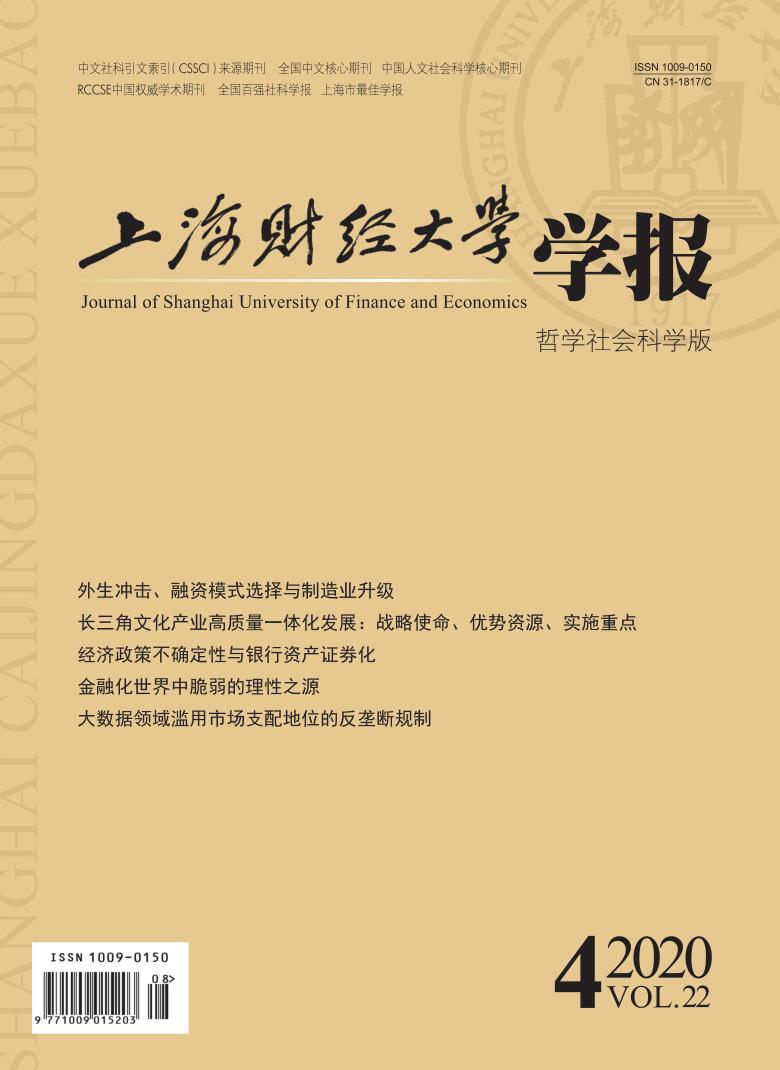在中国特殊的制度与文化情境之下,CEO声誉究竟是提高盈余质量的有效治理工具,还是强化真实盈余管理行为的驱动因素?针对上述问题,文章将委托代理理论与中国“面子”文化相结合,运用2012-2017年上市公司数据,实证检验了CEO声誉对真实盈余管理行为的“双刃”效应及作用路径。研究表明:CEO声誉与真实盈余管理行为之间具有显著的倒U形关系,即CEO声誉存在一个阈值,低于该阈值,两者呈现正相关关系,超过该阈值,则演变为负相关关系;CEO声誉通过倒U形曲线效应影响了CEO风险承担水平,进而促成了CEO声誉与真实盈余管理之间的倒U形关系,即CEO风险承担水平在两者之间具有非线性中介效应。通过拓展性分析发现,国有股权属性、CEO股权激励、CEO复合型职业背景均可以弱化CEO声誉与真实盈余管理行为的倒U形关系。研究结论揭示了CEO声誉在中国情境下的双重治理效应及作用机理,为真实盈余管理行为动因研究提供了新的经验证据。
CEO声誉对真实盈余管理的“双刃”效应研究:“逐利争名”还是“取义舍利”
摘要
参考文献
2 陈宋生,童晓晓. 双重监管、XBRL实施与公司治理效应[J]. 南开管理评论,2017,(6). DOI:10.3969/j.issn.1008-3448.2017.06.003
5 何友晖. 面子的动力: 从概念化到测量[A]. 翟学伟. 中国社会心理学评论(第2辑)[M]. 北京: 社会科学文献出版社, 2006.
6 黄光国, 胡先缙. 面子: 中国人的权力游戏[M]. 北京: 中国人民大学出版社, 2004.
8 吕文栋,林琳,赵杨. 名人CEO与企业战略风险承担[J]. 中国软科学,2020,(1). DOI:10.3969/j.issn.1002-9753.2020.01.013
11 沈烈,张西萍. 新会计准则与盈余管理[J]. 会计研究,2007,(2). DOI:10.3969/j.issn.1003-2886.2007.02.008
13 陶厚永,章娟,刘艺婷. 外部监督、面子需要与企业高管的承诺升级[J]. 南开管理评论,2019,(4). DOI:10.3969/j.issn.1008-3448.2019.04.001
14 王晓亮,蒋勇,刘振杰. 董事会断裂带、会计稳健性与真实盈余管理[J]. 审计研究,2019,(5). DOI:10.3969/j.issn.1002-4239.2019.05.006
15 魏明海. 盈余管理基本理论及其研究述评[J]. 会计研究,2000,(9). DOI:10.3969/j.issn.1003-2886.2000.09.009
22 Baillon A,Bleichrodt H,Spinu V. Searching for the reference point[J]. Management Science,2020,66(1):93–112. DOI:10.1287/mnsc.2018.3224
23 Benischke M H,Martin G P,Glaser L. CEO equity risk bearing and strategic risk taking:The moderating effect of CEO personality[J]. Strategic Management Journal,2019,40(1):153–177. DOI:10.1002/smj.2974
24 Brown M,Serra-Garcia M. The threat of exclusion and implicit contracting[J]. Management Science,2017,63(12):4081–4100. DOI:10.1287/mnsc.2016.2572
25 Cho S Y,Arthurs J D,Townsend D M,et al. Performance deviations and acquisition premiums:The impact of CEO celebrity on managerial risk‐taking[J]. Strategic Management Journal,2016,37(13):2677–2694. DOI:10.1002/smj.2468
26 Cohen D A,Zarowin P. Accrual-based and real earnings management activities around seasoned equity offerings[J]. Journal of Accounting and Economics,2010,50(1):2–19. DOI:10.1016/j.jacceco.2010.01.002
27 Edwards J R,Lambert L S. Methods for integrating moderation and mediation:A general analytical framework using moderated path analysis[J]. Psychological Methods,2007,12(1):1–22. DOI:10.1037/1082-989X.12.1.1
28 Fama E F. Agency problems and the theory of the firm[J]. Journal of Political Economy,1980,88(2):288–307. DOI:10.1086/260866
29 Ferentinou A C,Anagnostopoulou S C. Accrual-based and real earnings management before and after IFRS adoption:The case of Greece[J]. Journal of Applied Accounting Research,2016,17(1):2–23. DOI:10.1108/JAAR-01-2014-0009
30 Francis J,Huang A H,Rajgopal S,et al. CEO reputation and earnings quality[J]. Contemporary Accounting Research,2008,25(1):109–147. DOI:10.1506/car.25.1.4
31 Gomez-Mejia L R,Neacsu I,Martin G. CEO risk-taking and socioemotional wealth:The behavioral agency model,family control,and CEO option wealth[J]. Journal of Management,2019,45(4):1713–1738. DOI:10.1177/0149206317723711
32 Graham J R,Harvey C R,Puri M. Managerial attitudes and corporate actions[J]. Journal of Financial Economics,2013,109(1):103–121. DOI:10.1016/j.jfineco.2013.01.010
33 Grant J,Markarian G,Parbonetti A. CEO risk-related incentives and income smoothing[J]. Contemporary Accounting Research,2009,26(4):1029–1065. DOI:10.1506/car.26.4.2
34 Haans R F J,Pieters C,He Z L. Thinking about U:Theorizing and testing U‐and inverted U‐shaped relationships in strategy research[J]. Strategic Management Journal,2016,37(7):1177–1195. DOI:10.1002/smj.2399
35 Hayward M L A,Rindova V P,Pollock T G. Believing one's own press:The causes and consequences of CEO celebrity[J]. Strategic Management Journal,2004,25(7):637–653. DOI:10.1002/smj.405
36 Jian M,Lee K W. Does CEO reputation matter for capital investments?[J]. Journal of Corporate Finance,2011,17(4):929–946. DOI:10.1016/j.jcorpfin.2011.04.004
37 Kahneman D,Tversky A. Prospect theory:An analysis of decision under risk[J]. Econometrica,1979,47(2):263–291. DOI:10.2307/1914185
38 Lovelace J B,Bundy J,Hambrick D C,et al. The shackles of CEO celebrity:Sociocognitive and behavioral role constraints on “star” leaders[J]. Academy of Management Review,2018,43(3):419–444. DOI:10.5465/amr.2016.0064
39 Malmendier U,Tate G. Superstar CEOs[J]. The Quarterly Journal of Economics,2009,124(4):1593–1638. DOI:10.1162/qjec.2009.124.4.1593
40 Martin G P,Gomez-Mejia L R,Wiseman R M. Executive stock options as mixed gambles:Revisiting the behavioral agency model[J]. Academy of Management Journal,2013,56(2):451–472. DOI:10.5465/amj.2010.0967
41 Milbourn T T. CEO Reputation and stock-based compensation[J]. Journal of Financial Economics,2003,68(2):233–262. DOI:10.1016/S0304-405X(03)00066-7
42 Roychowdhury S. Earnings management through real activities manipulation[J]. Journal of Accounting and Economics,2006,42(3):335–370. DOI:10.1016/j.jacceco.2006.01.002
43 Schoar A,Zuo L. Shaped by booms and busts:How the economy impacts CEO careers and management styles[J]. The Review of Financial Studies,2017,30(5):1425–1456. DOI:10.1093/rfs/hhw111
44 Weng P S,Chen W Y. Doing good or choosing well?Corporate reputation,CEO reputation,and corporate financial performance[J]. The North American Journal of Economics and Finance,2017,39:223–240. DOI:10.1016/j.najef.2016.10.008
引用本文
徐宁, 张阳, 徐向艺. CEO声誉对真实盈余管理的“双刃”效应研究:“逐利争名”还是“取义舍利”[J]. 上海财经大学学报, 2020, 22(4): 107-122.
导出参考文献,格式为:





 7068
7068  10549
10549

